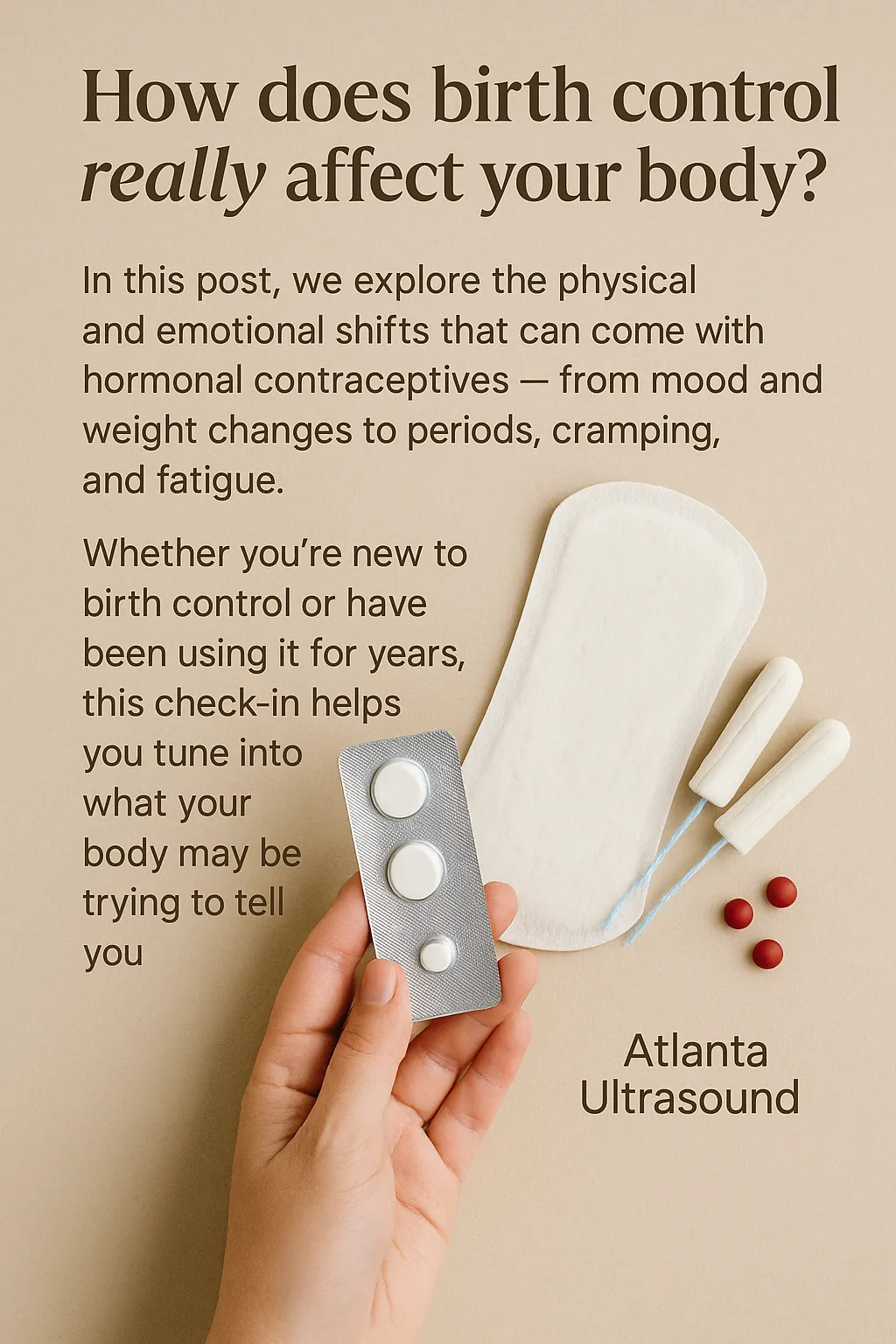
Seeing Is Believing: The Benefits of Ultrasound for Patients and Providers

Birth Control & Your Body: Let’s Check In
Birth Control & Your Body: Let’s Check In
Whether you’ve been on birth control for years or you’re just getting started, it’s always worth pausing to ask: “How is my body really feeling?”
Birth control isn’t just about preventing pregnancy — it interacts with your hormones, your mood, your skin, your cycle, and even your sense of self. At Atlanta Ultrasound, we believe that informed choices lead to empowered care. So today, we’re slowing things down for a body check-in. Let’s talk about what birth control might be doing beneath the surface.
What Is Birth Control Really Doing Inside Your Body?
Most birth control methods — pills, patches, injections, IUDs, and implants — contain synthetic hormones that mimic estrogen or progesterone. These hormones work by:
Preventing ovulation
Thickening cervical mucus (making it harder for sperm to reach the egg)
Thinning the uterine lining
But while these effects help prevent pregnancy, they can also trigger changes in other parts of your body. And not all of them are negative — but all of them deserve attention.
Mood, Mental Health & Birth Control
Many women report emotional shifts when starting or changing birth control. These might include:
Increased irritability or mood swings
Anxiety or sadness
Changes in libido
Some people feel more balanced on hormonal birth control — while others feel like they’re on an emotional rollercoaster. If you’ve ever thought, “I just don’t feel like myself lately,” it might be worth evaluating if your birth control is playing a role.
Weight Changes: What’s Normal?
Let’s get real: some methods of birth control — like the shot (Depo-Provera) — have been linked to weight gain in some people, while others (like low-dose pills) show little effect.
Your body is unique. If you notice changes in your appetite, metabolism, or water retention, your birth control may be involved. It’s not always the cause, but it’s always worth tracking.
Periods, Flow & Cramps
Hormonal birth control can:
Lighten or eliminate periods
Reduce or increase cramping
Cause spotting between cycles
Shift your regular cycle timing
If your period has suddenly disappeared or become more painful, you’re not imagining things — your contraceptive method might be the reason.
Energy & Fatigue
Hormonal shifts can impact your thyroid, iron levels, and sleep patterns. If you’re on birth control and noticing unusual fatigue, take note. It could be unrelated — but your body is always giving you clues.
When to Check In With a Provider
Here’s when you should schedule a check-in (we’re here for you!):
You’ve switched methods and feel “off”
Your mood, weight, or cycles have changed significantly
You’re getting migraines or unusual cramps
You’re not sure if your current birth control is still the best fit for your lifestyle
At Atlanta Ultrasound, we’re not just here for imaging — we’re here to support your full health journey. Whether it’s checking for ovarian cysts, tracking irregular bleeding, or helping you understand your options, our team is ready to help you feel seen and heard.
Your Body, Your Birth Control, Your Choice
No one knows your body like you do. And no method of birth control is perfect for everyone. The best approach is an informed one — where you check in regularly, ask questions, and listen to what your body is telling you.
You deserve a method that supports your peace of mind and your physical well-being. Let’s check in — together.
Contact us today to schedule your ultrasound scan and take a decisive step towards understanding your health.
📍 Multiple locations in Metro Atlanta, GA
📞 Contact: 678-590-3300
🌐 Website: www.atlantaultrasound.com
Disclaimer: The content of this blog post, authored by a sonographer, is provided for educational and informational purposes only. It is not intended as medical advice, nor should it substitute for professional medical consultation, diagnosis, or treatment. Always seek the advice of your physician or other qualified health providers with any questions you may have regarding a medical condition or health concerns.
